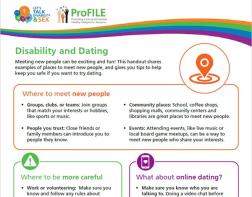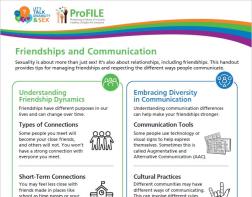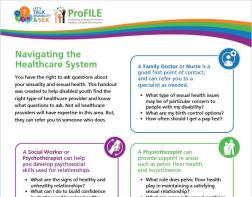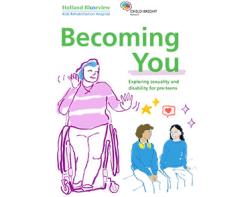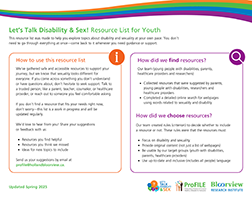Welcome to our youth resource page!
Here you will find videos, guides and other resources to provide information and guidance on sexuality related topics. These resources were created with young adults with disabilities, parents of children with disabilities, educators, researchers and healthcare providers.
These handouts were created in collaboration with youth advisory council members.
Plain text handouts
Click on the drop down sections to access plain text versions of some of the PDF resources shown above.
Disability and dating
Meeting new people can be exciting and fun! This handout shares examples of places to meet new people, and gives you tips to help keep you safe if you want to try dating.
Where to meet new people
- Groups, clubs or teams: Join groups that match your interests or hobbies, like sports or music
- People you trust: Close friends or family members can introduce you to people they know.
- Community places: School, coffee shops, shopping malls, community centers and libraries are great places to meet new people.
- Events: Attending events, like music or local board game meetups, can be a way to meet new people who share your interests.
Where to be more careful
- Work or volunteering: Make sure you know and follow any rules about dating at your work
- Support groups: Be mindful of other people’s privacy and personal boundaries. Some people aren’t comfortable dating people they know from therapy, grief, or support groups
- Public Spaces: Avoid sharing personal details, like your address, with people you don’t know. Be aware of your surroundings and keep conversations general at first, like discussing the weather, or your favourite TV shows.
What about online dating?
- Make sure you know who you are talking to. Doing a video chat before meeting in person is a good way to check if someone is who they say they are.
- Tell a friend or family member your plans if you decide to meet up with someone you met online. Always meet in a safe, public space for the first few dates, like a coffee shop.
- Watch out for warning signs, like asking you for money or asking about your financial situation.
- If something feels uncomfortable, it’s okay to stop communicating.
Friendships and communication
Sexuality is about more than just sex! It’s also about relationships, including friendships. This handout provides tips for managing friendships and respecting the different ways people communicate.
Understanding friendship dynamics
Friendships have different purposes in our lives and can change over time.
Types of connections
Some people you meet will become your close friends, and others will not. You won’t have a strong connection with everyone you meet.
Short-term connections
You may feel less close with friends made in places like school as time passes or your life changes. This is normal.
Embracing diversity in communication
Understanding communication differences can help make your friendships stronger.
Communication tools
Some people use technology or visual signs to help express themselves. Sometimes this is called Augmentative and Alternative Communication (AAC).
Cultural practices
Different communities may have different ways of communicating. This can involve different rules, slang or visual methods, such as in d/Deaf culture.
Tips for navigating friendships
Respect differences
Be open to learning from other people. We can learn a lot from each other’s backgrounds and experiences.
Maintain boundaries
You may not want to be someone’s friend. Or, you may not want to do the same things as your friends. Tell them clearly and kindly if that is the case.
Slow down and pay attention
Take the time to understand how your friends communicate. Be patient, especially when learning new ways to communicate or when asking for clarification.
Navigating the health-care system
You have the right to ask questions about your sexuality and sexual health. This handout was created to help disabled youth find the right type of healthcare provider and know what questions to ask. Not all healthcare providers will have expertise in this area. But, they can refer you to someone who does.
A family doctor or nurse is a good first point of contact, and can refer you to a specialist as needed.
- What type of sexual health issues may be of particular concern to people with my disability?
- What are my birth control options?
- How often should I get a pap test?
A social worker or psychotherapist can help you develop psychosocial skills used for relationships.
- What are the signs of healthy and unhealthy relationships?
- What can I do to build confidence in starting and keeping healthy relationships?
A physiotherapist can provide support in areas such as pelvic floor health, and incontinence.
- What role does pelvic floor health play in maintaining a satisfying sexual relationship?
- What are some safe sexual positions I can try?
A gynecologist can support you in your reproductive and sexual health. They can also provide information about birth control and safe sex options.
- What types of health issues can affect my reproductive system?
- What should I keep in mind for birth control or family planning, considering my disability?
An occupational therapist or recreation therapist can provide support in adapting sexual activities to your needs, such as different positioning options to try.
- What modifications or accommodations can you suggest to enhance my sex life?
- Are there safety considerations I should be aware of when exploring different positioning options?
An endocrinologist can help with hormone-related issues affecting sexuality and desire, and give advice on how hormone treatments might impact your sexual life.
- How can changes in hormones or hormone treatments affect my sexual health?
- What impact will my hormone treatments have on my fertility?
A personal support worker can help with daily living activities and offer support for physical tasks such as hygiene or intimacy.
- How can you support me with the physical aspects of intimacy, like positioning or mobility, to ensure comfort and safety?
- How can we work together so that I feel comfortable with my body and personal care?
A urologist can provide care related to urinary and bowel functioning, which may affect sexual health. They can also help with issues such as erectile dysfunction, incontinence, and sexual sensation.
- How might my disability affect the sensations I experience during sex, and what can I do to manage or enhance these sensations?
- What can I do to maintain good bladder health and lower my risk of urinary tract infections?
Finding the right fit: things to think about
- Is the office accessible?
- Do I feel safe and comfortable there?
- Does the healthcare provider have experience working with disabled youth?
- Will they collaborate with me in decision making about my healthcare?
- Do they communicate in a way that is clear and respectful?
